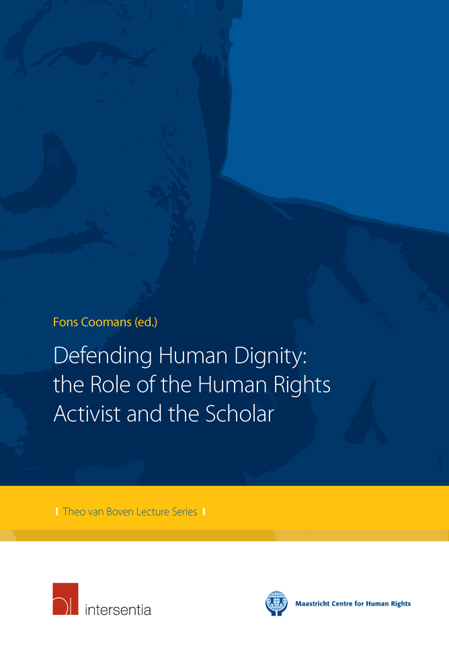Book contents
- Frontmatter
- Contents
- Miscellaneous Frontmatter
- 5th Annual Theo van Boven Lecture
- Defending Rights: Human Rights Defenders in the Front Line
- 6th Annual Theo van Boven Lecture
- Slavery and the Human Rights Scholars
- The Politics of Human Rights: Slavery and the Sustainable Development Goals
- Miscellaneous Endmatter
Slavery and the Human Rights Scholars
Published online by Cambridge University Press: 27 September 2018
- Frontmatter
- Contents
- Miscellaneous Frontmatter
- 5th Annual Theo van Boven Lecture
- Defending Rights: Human Rights Defenders in the Front Line
- 6th Annual Theo van Boven Lecture
- Slavery and the Human Rights Scholars
- The Politics of Human Rights: Slavery and the Sustainable Development Goals
- Miscellaneous Endmatter
Summary
It is too often repeated that “it is an honour” when invited to give a talk; and yet for me the invitation to give the Theo van Boven Lecture this evening touches me deeply, as for me it is both a vindication of my work carried out in splendid isolation, with very little contact with the invisible college of international lawyers; and a recognition of which I am the proudest: recognition based on the merits of its scholarly value. I welcome the opportunity of this Lecture to present to a number of individuals that I rate very highly in regard to their work around issues of international human rights law including, foremost Theo van Boven, whose work as the Director of the Human Rights Division within the United Nations and later in his capacity of both Special Rapporteur on the Right to Reparation to Victims of Gross Violations of Human Rights and Special Rapporteur related to Torture came to be at the centre of what we now take for granted: an international framework of human rights norms and protection and a growing number of societies where human rights are culturally embedded. So, I trust you will understand that it is deeply gratifying for me to say: it is an honour to be here this evening to present the 2015 Theo van Boven Lecture. I wish to extend my gratitude to the Maastricht Centre for Human Rights and more specifically to its Director, Professor Fons Coomans, for inviting me this evening and for his hospitality. Prof Coomans’ scholarship on issues of human rights, both in its breadth and substance, speaks to the honour I feel in having received this invitation adds that much more to the feelings I hold this evening.
The Role of Human Rights Scholars
This evening I wish to consider with you what it means to be a scholar of international human rights law – an academic writer who specialises in issues of human rights – what responsibilities that entails, and wish to sketch out for you my work on contemporary forms of slavery to demonstrate how fundamental historical and archival research is to establishing a scholarly basis upon which to advance knowledge in the area of international human rights law.
- Type
- Chapter
- Information
- Defending Human DignityThe Role of the Human Rights Activist and the Scholar, pp. 21 - 40Publisher: IntersentiaPrint publication year: 2016



